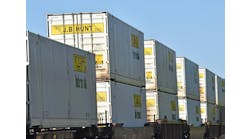The comments of Scott Davis, chief financial officer of UPS, at a meeting of investors and analysts in mid-May did little to tip the parcel carrier’s hand on its acquisition of Overnite Transportation. That deal was announced just days after Davis and UPS CEO Mike Eskew discussed the company’s recent financial results and future plans.
The cash deal for $43.25 per share represents an estimated $1.25 billion price tag for the parcel giant to enter the less-than-truckload (LTL) segment. Overnite represents an estimated 5% of the LTL market, according to equity analyst firm Morgan Stanley.
The UPS move follows rival FedEx’s acquisition of American Freightways by four years. The American Freightways acquisition for $1.2 billion, when combined with the Viking Freight unit FedEx had acquired in 1998 when it bought Caliber System for $2.1 billion, gave FedEx a national network of regional LTL carriers.
During the intervening years, the LTL segment has seen continued consolidation, one of the largest deals involving the Yellow-Roadway combination and Yellow Roadway Corp.’s most recent announcement that it would acquire the regional LTL network and truckload operations of USF. Morgan Stanley analyst Chad Bruso expects consolidation within the LTL industry to continue, but among smaller carriers.
Bruso also commented that DHL, the third largest parcel/expedited carrier in the U.S., is unlikely to make any similar acquisitions given its anticipated $550 million loss for 2005 (which follows similar losses in 2004). Earlier in the year, DHL parent Deutsche Post reiterated its commitment to the U.S. market despite losses and anticipates breaking even financially in 2006.
Overnite is an established, well-positioned carrier, says Legg Mason analyst John Larkin. He contrasts this to Yellow Roadway Corp.’s acquisition of USF, which he feels is less well positioned. But like the USF deal, UPS will be looking at issues with the International Brotherhood of Teamsters (IBT). Yellow Roadway, a unionized company acquired a mixture of union and non-union operations within USF. UPS, whose workers are represented by the IBT, is acquiring a non-union carrier that spent years fending off the Teamsters.
Teamster General President James P. Hoffa said the union would “closely monitor UPS’ purchase. . .to make sure members’ jobs are not adversely impacted by the purchase.” UPS reportedly told the union Overnite would be operated separately from the parcel business and will not affect jobs or feeder services for the parcel operation currently performed by union workers. “If this purchase helps UPS to continue to successfully compete in the global marketplace in the long run, it will increase our members’ job security,” said Ken Hall, director of the Teamsters’ Parcel and Small Package Division.
Overnite was the target of organizing efforts that embroiled the company and the union in contentious legal battles from 1999 until 2002.
Earlier in 2005, speculation surfaced that cash-rich UPS was in negotiations with U.K.-based logistics provider Exel. Both parties refused comment at the time, and the Exel rumor resurfaced later with Deutsche Post or FedEx as possible suitors.
For background on Overnite and LTL performance:
LTL Carriers Highly Profitable
For background on UPS/Exel rumors:


